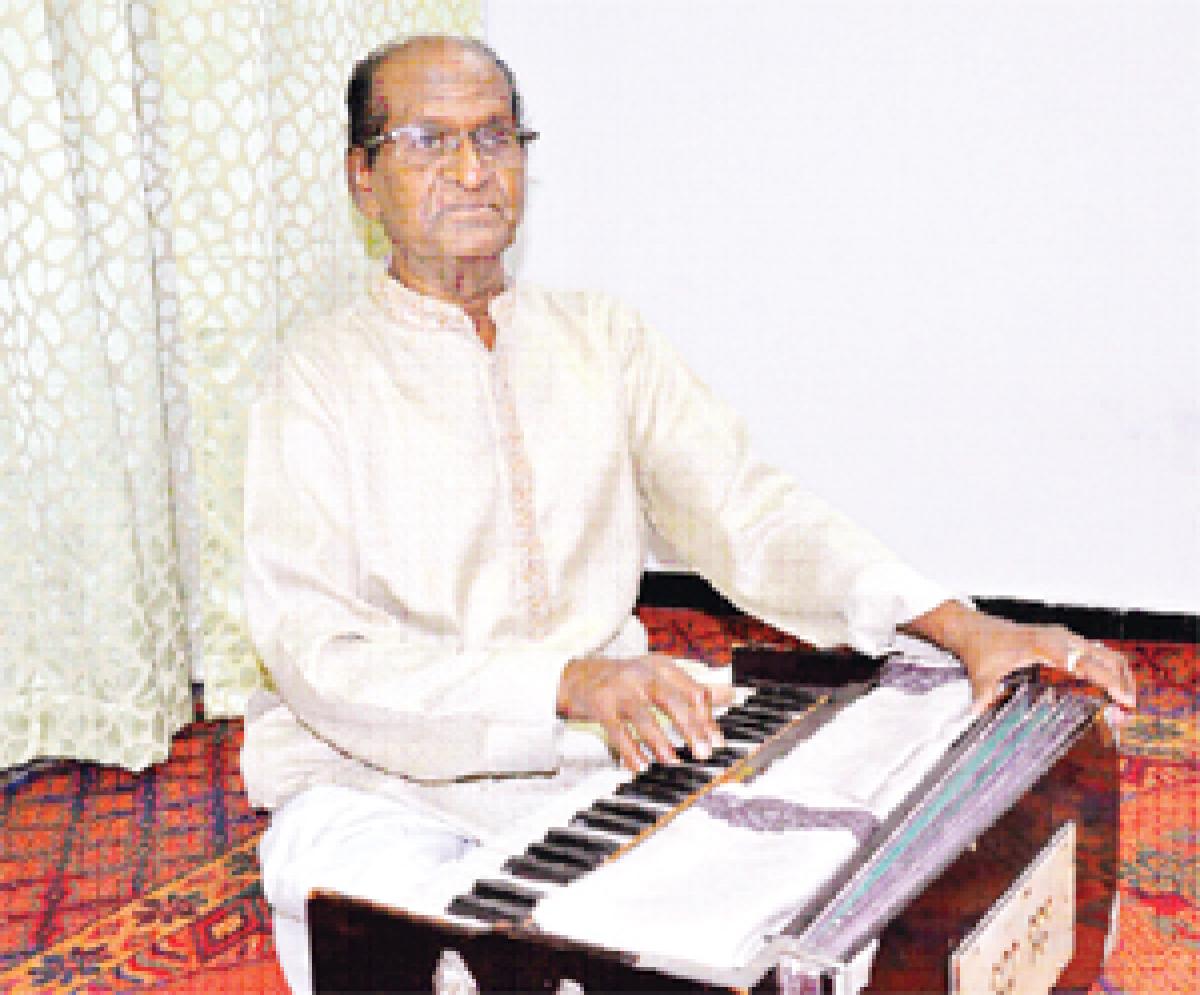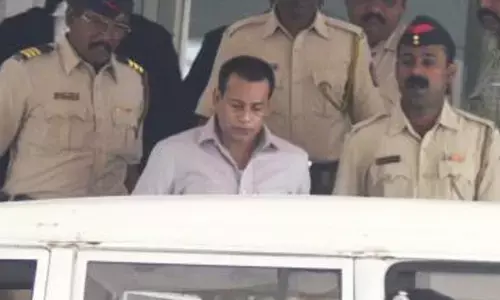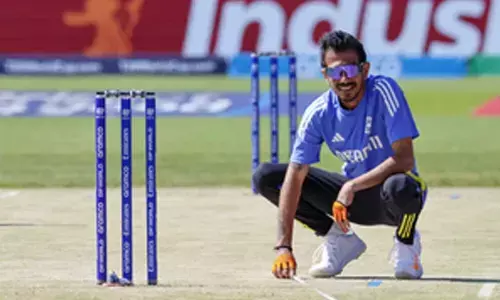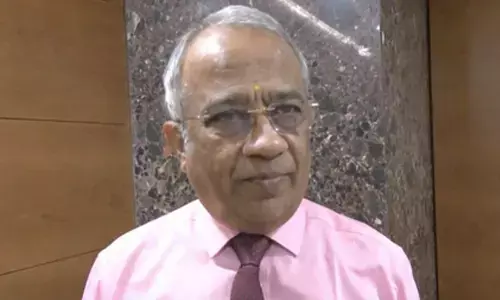The doyen of Urdu ghazals

The Doyen Of Urdu Ghazals. For more than seven decades, one voice brought laurels to the city of the Nizams. People knew this voice by the name Vithal Rao. Born in Hyderabad to a poor family, Vithal Rao started singing from a young age.
.jpg) For more than seven decades, one voice brought laurels to the city of the Nizams. People knew this voice by the name Vithal Rao. Born in Hyderabad to a poor family, Vithal Rao started singing from a young age. He was a part of courtly gatherings and later, he garnered accolades for teaching ghazals to his disciples. Many of his students now carry his legacy in Hyderabad and across India.
For more than seven decades, one voice brought laurels to the city of the Nizams. People knew this voice by the name Vithal Rao. Born in Hyderabad to a poor family, Vithal Rao started singing from a young age. He was a part of courtly gatherings and later, he garnered accolades for teaching ghazals to his disciples. Many of his students now carry his legacy in Hyderabad and across India.
This artiste dedicated all his life to ghazal singing. However, irony is, the honour he should have received in the music world, he did not get. Yet, he relentlessly continued singing, and till date he has many followers. His death in recent past has brought a wave of grief among the music aficionados.
In 2009, I spoke with him for three hours at his residence in Hindi Nagar. I was searching for anecdotes of prominent personalities of old Hyderabad.
Over to Vithal Rao
I was born in the year 1930 (according to records, 1931) in an area near to Gosha Mahal Baradari. It was known as ‘Nishan-e-Haathi’. These were military barracks where the military personnel and officers had 40, 50, and 100 square metre houses in the area. Today, this place is known as ‘Hindi Nagar’. We heard that the area near Baradari had a big pool, where the royal ladies used to bathe, and then used the Baradari to change their clothes.
My father was a famous body-builder in the military. He wanted others at home also, to be like him. He admitted me into Goshamahal School. I was very lean, and that’s why my father gave me the nickname ‘Phool Sungani’. The medium of instruction in school was Urdu, although Telugu and English were also taught. There was a temple near our home, and often devotional music concerts were held in the temple. I was around seven or eight years old then. I would skip school to attend the programmes and was the first one to be present at the temple. Due to this; I was given the responsibility to lay the carpets. When my father came to know that I skipped school to attend these musical concerts, he immediately took me to the famous music teacher Pandit Laxman Rao Panchpothi. He was visually impaired.
Pandit Laxman Rao Panchpothi was a disciple of the famous Abdulkarim Khan. My father stored rations for three years in his house for me and practically gave me away to him. His house was in Osman Shahi and since childhood, I used to stay in his house. Panditji used to stay in a rented place, and he was a music composer for the Deccan Radio. This radio station was at Chiraag Ali Lane. I went for programmes with him, and by then, my hobby became my passion. I was fast in learning and what took 2-3 months for others, I would learn in 2-3 days. I learnt the harmonium when I was eight-years-old. During those days, I sang devotional songs on Saroornagar Radio. I did not learn singing ghazals until that point. Guruji used to teach only classical music.
“Chaman mein aashiyan hai aur main hoon,
Gubaar karwan hain aur main hoon.”
This was the first ghazal I learnt. I practiced this ghazal for three months. One day Raoof Sir (famous ghazal singer from whom I learnt ghazals) said, “Son, you know Urdu. Try to read and sing ghazals by yourself.”
Those days Sir used to teach at ‘Adaab’ concerts, and he would often take me to those events. Today, when I think about past, I feel that whatever Vithal Rao is, it is because of my masters and their dedication towards me. Raoof Sir was not only a good musician but also a very good person. After learning ghazals from him, I started to sing both classical music and ghazals. During those days, there were small events organised at Barkas, and I used to get Rs 5 for singing all night. Barkas prominently had Arab community, who had a good sense of rhythm, and they liked my songs.
Who is that woman singing?
One day I was singing at Barkas all-night-long. At dawn, when I finished singing, suddenly, a woman entered the house. She wanted to know who was the woman singing and why did she stop? She was one of the royal servants of the Nizam. She was going to the house of Princess Pasha (daughter of the Nizam) and halted on hearing my voice. She mistook my voice for a woman’s; I was still a kid then. People then told her that it was in fact a boy who was singing.
People were standing with hands folded and the woman asked me to start singing again. After hearing me sing, she asked me to go with her and took me in a chariot to Dhoodh Khaana, where she presented me to Princess Pasha at Bogulkunta. She told the Princess that I sing. The Princess then asked, “Kid, do you sing?” I nodded in a yes. Since, I was singing all night, I was tired and sleepy. I just wanted to get out of there. I had no idea though, that she was the daughter of the Nizam. She gave me a piece of paper on which, she wrote something. It was some kind of comic poetry. I don’t remember it clearly, but it went something like this…
“Main motor se jaa rahi thi,
Ek aadmi ghoor ghoor ke dekha,
Kaun tha main kya bataoon.”
She asked me to sing those lines. I started singing, and the Princess was happy with my performance and asked me to stay with her. She asked her munshi (head of clerks) to inform my parents about it. At this point, I still did not realise that she was the King’s daughter. I tried to run away from that place, but the guards used to shoo me back inside. The Princess treated me like her own child. I used to even eat along with her. During my stay there, I ate many delicious delicacies on a daily basis. After about 15 days, they sent me back to my house in a big chariot. When we reached, all the kids in the vicinity gathered near the chariot. Princess Pasha gave 30 gold coins to the munshi in a bag, and asked him not to give it to me, but give it to my father instead. When the munshi gave the coins to my father, he started shivering. He asked the others in the family - where we would keep these gold coins. Finally, my aunt (father’s sister) kept those coins. My father wondered why the Nizam’s daughter gave so many gold coins to a child.
My teacher Laxmiah Pantalu who was also a maestro in classical music taught Telugu to the Nizam. He told the Nizam about me. Princess Pasha also mentioned about me to the Nizam. In those days, I joined the military’s children band, ‘Indian Orchestra’.
Nizam and Music
Secunderabad Club was all set to host a programme and Idrus Bhadur made a decision to include me in the event. Rehearsals started one week before the show. I think it was a Friday and we were practicing at Gymkhana (now Fateh Maidan Club). That day the Nizam suddenly entered our room. He was mighty angry and everyone in the room stood up. Using cuss words, the Nizam angrily asked "Who is that woman singing? One should not sing ‘Raag Bageshree’ during the day. Didn’t your teacher tell you that?"
I was frightened. Our in-charge responded to the Nizam and said, "It is a kid singing..." He barely even completed his sentence. I then stood up and told the Nizam that it was a rehearsal as we were practicing for the programme, which was scheduled at night in Secunderabad Club. On hearing this, his anger reduced. After asking and hearing my name he asked, "Are you the same boy who was staying with the Princess?"
I replied, ‘yes’. Then he picked up a sitar, which was beside him, and started wearing the mezrab (a plectrum, which is used for playing several Indian string instruments) on his index finger. He then started to play the sitar. The tune, which he was playing was exactly same as the one I was singing. He in turn enquired if I was singing the same raag.
I still remember that incident vividly. That day, I realised that the Nizam not only had knowledge of music but he could also present his musical skills when required. He told me that he would call me to his King Koti palace.
Later, I was told that the Nizam was heading for namaaz, and had stopped upon hearing the song, after which he started towards the mosque again.
In a few days, I received his invitation for me to sing a ghazal. I could sing ghazals, but did not master the art by then. As soon as I got the news, I approached Shankari Bai in a hurry. I told her that the Nizam has invited me, and I urged her to teach me a good ghazal. In those days, Shankari Bai used to sing in the Nizam's court. She quickly taught me one ghazal.
"Khabar tyohare ishq sunn na junoon raha na pari rahi,
Na toh tu raha, na toh main raha, jo rahi so be khabar rahi."
I was also taught adaab (Style of greeting) before going to King Koti. When I reached the palace, a few people were already sitting there. There was an empty chair with three big legs and, which seemed broken. A small carpet was next to it, so I sat there with my harmonium. As soon as the Nizam entered, I greeted him in the style I was taught by Shankari Bai, and started singing. After hearing the intro of the song, he patted his thighs and appreciated me. As I proceeded with the song, he repeated the same with shouts of appreciation for me. He was moving to the rhythm while listening to me singing. This continued for a while. I sang till the second paragraph (only two lines, which I repeated many times on his request). Suddenly he remarked, "My thighs are hurting, stop it now. I will invite you again." He did not even let me complete the second paragraph. After I stopped he asked me, "Shankari Bai has taught you this song, isn’t it?" I replied in the affirmative. After a few days his munshi came to me with 100 gold coins.
I sang the same ghazal five more times for the Nizam. Everytime I sang, he would never hear the complete song. I used to call Shankari bai “Mummy”. Later, she told me that she had been singing the same ghazal to the Nizam for the past 15 years. I was in the Nizam's military 'Indian Orchestra' for around eight years. As a havildar, I stood first in rifle training. The then General G N Chaudhary told the Major to give me 10 houses, which were 40 square feet each. However, my father said he wouldn’t know what to do with so many houses. So we just took three houses. They had clay tiles as the roof. The houses are still there with the only difference that, asbestos has taken the place of the tiles.
Muzzam Jah Shajia
I did many programmes for the Deccan Radio. However, I started singing ghazals under the aegis of Raoof sir. In those days, apart from Arif Raoof, Khwaja Mohammed Baig, Zakir Ali-Zahid Ali, Hussain Ali; Kanhaiyya Lal also sang ghazals.
Raoof Sir used to take me along with him for concerts. I went to Hill Fort for the first time with him. While introducing me to Prince Muzzam Jah Sahi, he told him, “This kid is interested in listening to ghazals, so I take him along with me.” He also told the prince that I am learning to sing, gave me one of his ghazal and asked me to sing.
“Karam kar rahe hai mitne se pehle,
Mita do hume azmaane se pehele.”
The Prince was elated after hearing me sing, and said that he would invite me soon, and he later he did call me to Hill Fort on Road number 3. He later asked me to visit him, daily. For 12 years, I used to go to Hill Fort every day, and each time he would give me Rs 500. The condition was that I had to sing ghazals penned by him, and forbade me to sing them anywhere else. Sometimes his brother-in-law Ali Pasha used to visit. The Prince praised me a lot in front of Ali Pasha. For that praise, I used to get Rs 100 extra apart from the fixed Rs 500. Those days I used to stay up all night. I introduced Hakim Ragi and Siddique sir to the Prince. Muzzam Jah invited them occasionally; however, he patronised me until his death. People like Qummar, Naushad, Dilip Kumar and other famous personalities visited the Prince and listened to my ghazals.
Bade Ghulam Ali Khan
In Hyderabad, there were two centres for ghazal and music – Nawab Yaar Jung and Nawab Turab Ali. Bade Gulam Ali Khan used to visit Zahir Yaar Jung often, and I mostly stayed with him. I learnt a lot from him, but when it came to formally teaching me, he refused. He said that his son Munnawar, was also my Guru Laxman Rao’s disciple and hence he can’t teach me. But he treated me like his son. I had many golden opportunities after that.
F M Saleem















